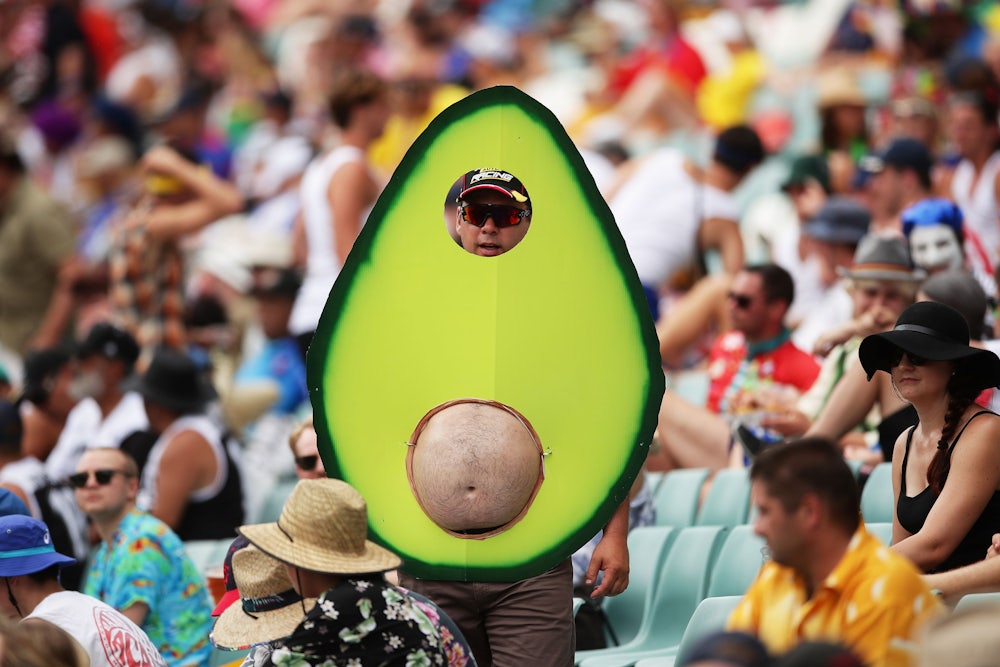America would run out of avocados in three weeks if President Donald Trump were to make good on his recent threat to close the border with Mexico. If you hadn’t heard that by now, congratulations. You successfully avoided the week’s biggest news story.
It’s been a veritable guacamole-gate since Monday, when the president of the world’s largest avocado distributor told Reuters how a border shutdown might affect his company’s product. “You couldn’t pick a worse time of year because Mexico supplies virtually 100 percent of the avocados in the U.S. right now,” Steve Barnard, of Mission Produce, said. “California is just starting and they have a very small crop, but they’re not relevant right now and won’t be for another month or so.”
This was just one part of a broader story about Mexican imports that would be affected by a border shutdown—not just avocados, but tequila and cucumbers and gasoline. Yet the potential for an avocado famine became a story in itself, spawning hundreds of stories online. More than a dozen segments aired across MSNBC, CNN, and Fox News—even one on ESPN. Late night comedians Stephen Colbert, Trevor Noah, and Seth Meyers all included the avocado’s now-uncertain fate in their opening monologues. Noah joked that white people might start illegally emigrating to Mexico if that was the only place to get their fix of avocado toast. “Holy Lack-a-Guacamole!” Colbert exclaimed. But Meyers smartly cut through the hysteria and guffaws.
“Officials are claiming that the United States will run out of avocados within three weeks if President Trump closes the U.S.-Mexico border, which is bad,” he said on Late Night. “But I think it’s way more disconcerting that everything has to be explained to the public in avocados.” There are far better reasons to be concerned about Trump’s proposal, Meyers said. “There will be a trade war! Families will be torn apart! Our national reputation will be damaged!” Then he delivered his punchline:
From tonight’s #LNSM: Wait, WHAT might happen to avocados?! 🥑 pic.twitter.com/iBa03J3MlW
— Late Night with Seth Meyers (@LateNightSeth) April 2, 2019
Meyers is right. To put the avocado hysteria in perspective, a border shutdown could cost American manufacturers hundreds of billions of dollars, dramatically raise the price of all fresh produce, prompt the U.S. stock market to plummet, and threaten the livelihood of countless day laborers. But there’s a reason those angles aren’t quite as popular: Journalists write stories about avocados to trick you into caring about something that you might not otherwise, whether it be climate change or a border shutdown or millennial spending habits.
Well, we do it for the insane clicks, too.
I know this because I helped spread the avocado meme. Back in 2014, when I was just starting out as an environmental reporter, I uncovered a statement in Chipotle’s annual report that climate change “could have a significant impact on the price or availability of some of our ingredients.” If prices rose, the fast-casual chain reported, “we may choose to temporarily suspend serving menu items, such as guacamole or one or more of our salsas, rather than paying the increased cost for the ingredients.”
I was elated. Back then, there was no Green New Deal, no Alexandria Ocasio-Cortez, no Sunrise Movement. No one cared about climate change. I had found a scoop that would make climate change relatable to a largely disinterested public.
The title of my article wasn’t particularly hyperbolic: “Chipotle Warns It Might Stop Serving Guacamole If Climate Change Gets Worse.” But it is, to this day, the most viral story I’ve ever written. It was picked up by Time, NPR, Fox News, The Atlantic, and then some. Mic and Business Insider published rebuttals, which I rebutted. Web traffic flowed like the Nile. And it left an impression—though not quite the one I’d hoped at the time. Today, after I write a particularly detailed or in-depth piece that does very well online, someone inevitably will tweet at me something to the effect of, “Still not as good as that guacamole story.” Which makes me want to climb into a dumpster and shut the lid. Forever.
Since then, I have reported on low-income and indigenous communities ravaged by oil and coal industry pollution; told stories about neglected senior citizen EPA employees; investigated the environmental claims of food waste companies and the sourcing of healing crystals; discovered that former EPA Administrator Scott Pruitt used taxpayer money to visit a coal mine in a Black Hawk helicopter. But it seems I will always be known for a 550-word story I wrote when I was 24 years old.
I used to think that it was perfectly acceptable for journalists to cater to their audience’s most elementary interests and desires. After all, if avocado stories get people to care about global warming, what’s the harm?
But I’m not convinced that news about a potential avocado shortage accomplishes that. These stories may simply cause avocado lovers to express performative panic on social media—or worse, to confuse the hook for the takeaway. When we turn the trivial consequence of a crisis into huge news, it risks trivializing the crisis itself. No guacamole? That’s it? Maybe climate change isn’t such a menace after all...
And it certainly creates an opening for partisans who wish to deny the reality of such crises. At least four times on Fox News on Tuesday—and frequently on right-wing Twitter—conservatives invoked the potential avocado shortage to defend Trump’s border shutdown. Losing avocados, they say, isn’t that big of a deal. They’re at least right about that.
